
The Japanese missions to Imperial China were diplomatic embassies which were intermittently sent to the Chinese imperial court. Any distinction amongst diplomatic envoys sent from the Japanese court or from any of the Japanese shogunates was lost or rendered moot when the ambassador was received in the Chinese capital.
Extant records document missions to China between the years of 607 and 839 (a mission planned for 894 was cancelled). The composition of these imperial missions included members of the aristocratic kuge and Buddhist monks. These missions led to the importation of Chinese culture, including advances in the sciences and technology. These diplomatic encounters produced the beginnings of a range of schools of Buddhism in Japan, including Zen.
From the Sinocentric perspective of the Chinese court in Chang'an, the several embassies sent from Kyoto were construed as tributaries of Imperial China; but it is not clear that the Japanese shared this view.[1]
China seems to have taken the initiative in opening relations with Japan. The Emperor Yang of Sui dispatched a message in 605 which read:
The sovereign of Sui respectfully inquires about the sovereign of Wa.[2]
The court of Empress Suiko responded by sponsoring a mission led by Ono no Imoko in 607. A message carried by that mission, believed to have been written by Prince Shōtoku, contains the earliest known written instance in which the Japanese archipelago is referred to by a term meaning "land of the rising sun."[3] The salutation read, in part:
From the sovereign of the land of the rising sun (hi izuru tokoro) to the sovereign of the land of the setting sun."[4]
The Japanese missions to Sui China (遣隋使, Kenzui-shi) included representatives sent to study government and technology.
The Japanese missions to Tang China (遣唐使, Kentō-shi) are the best known; 19 missions were completed. A 20th mission had been planned for 894 (Kanpyō 6, 8th month), including the appointment of ambassadors. However, shortly before departure, the mission was halted by Emperor Uda because of reports of unsettled conditions in China.[5] The emperor's decision-making was influenced by the persuasive counsel of Sugawara no Michizane.[6]
- ^ Yoda, Yoshiie et al. (1996). The Foundations of Japan's Modernization: a comparison with China's Path towards Modernization, pp. 40-41.
- ^ Varley, Paul. (1980). Jinnō Shōtōki, p. 128.
- ^ Titsingh, Isaac. (1834). Annales des empereurs du japon, p. 40.
- ^ Varley, Paul. (1973). Japanese Culture: A Short History. p. 15.
- ^ Titsingh, pp. 127-128.
- ^ Kitagawa, Hiroshi. (1975). The Tale of the Heike, p. 222.